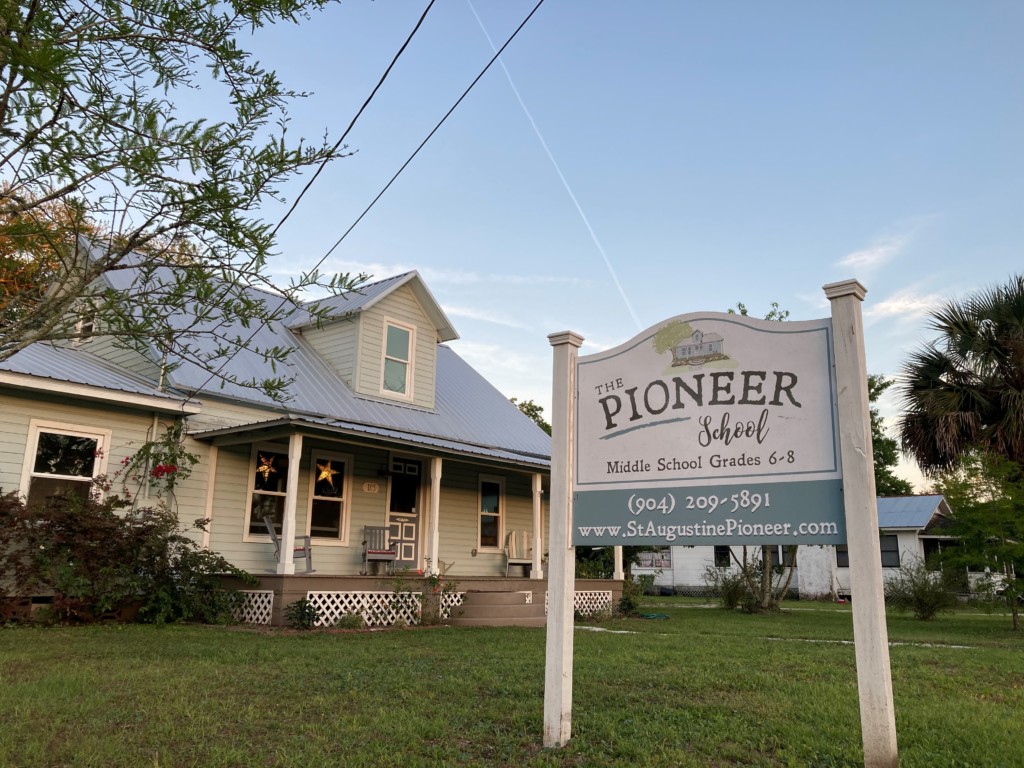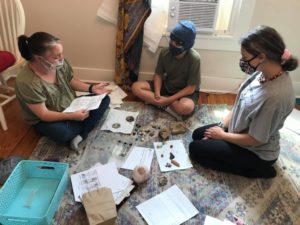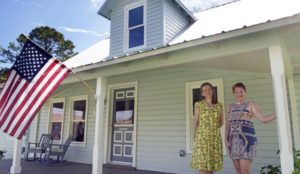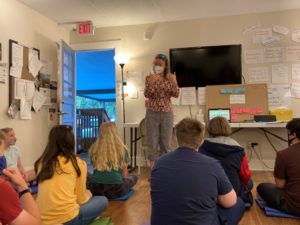
Editor’s note: reimaginED is proud to reintroduce to our readers our best content of 2021. This post from Step Up For Students director of policy and public affairs Ron Matus originally published on May 12.
 ST. AUGUSTINE, Fla. – As the sun rises and smoke wisps from a diffuser, 16 students sit cross-legged in a century-old house with a tin roof and a yard sign that reads, “HATE HAS NO HOME HERE.” Their principal with the British accent, Cristina Pope, greets each one with an exchange in Spanish, then eventually settles them into a meditation session.
ST. AUGUSTINE, Fla. – As the sun rises and smoke wisps from a diffuser, 16 students sit cross-legged in a century-old house with a tin roof and a yard sign that reads, “HATE HAS NO HOME HERE.” Their principal with the British accent, Cristina Pope, greets each one with an exchange in Spanish, then eventually settles them into a meditation session.
This isn’t how most middle schools in America start their day.
But at The Pioneer School, it’s routine. And far from the only thing about this micro-school that sweetly clashes with “school” as we know it.
The rest of the morning, these students (and, on this day, 11 more tuning in from home) will take core classes through Florida Virtual School. Then they’ll immerse themselves in enrichment offerings as eclectic as it gets:
Coding, gardening, public speaking, civil rights history, an award-winning drama program …
Along the way, they’ll learn how to make fire, use a knife, change a flat …
In the fall, they’ll add small engine repair.
The Pioneer curriculum is a blend of Waldorf, Montessori and other learning models Pope fused and honed. It’s aimed at developing skills in “leadership, citizenship, entrepreneurship … and practical life responsibilities” that will help Pioneer students excel at the next level, in whatever they pursue.
Incredibly, it’s all there for $8,000 a year.
For context, $8,000 a year is about 70 percent of per-pupil spending in Florida public schools.

Even better, 14 Pioneer students use state choice scholarships, including 10 for families of modest means. As a result, the sons and daughters of accountants, housekeepers, boutique owners and firefighters learn side by side, in an environment that considers them all “gifted.”
“Where’s your child going to learn bread making, archery, boat building, drama, STEM … all in one year’s time?” said Serena Baar, a pre-school teacher whose 14-year-old, Trinity, attends using a Florida Tax Credit Scholarship. “It’s just a well-rounded, well-thought-out school.”
It’s also a model of possibility – another example of the diversity of learning options that can bloom when educators have real power to create their own systems, and parents have real power to access the ones that work best for their children.
With traditional schooling, “We’re trying to shove square pegs into round holes,” said Teri Aboulafia, who co-founded the school with Pope. But with education choice, “You can make it whatever you want.”
***
Pope is a University of Oxford graduate who homeschooled her son 14 years and runs a small permaculture homestead.
Aboulafia is a 20-year veteran of the restaurant business who helped push for a public Montessori school.
At Pioneer, Pope leads the teaching. Aboulafia handles operations.
They’re “like peanut butter and jelly,” said Baar. “The perfect combination.”
The idea for the school took root when Aboulafia’s kids took a class at Pope’s place. They learned to bake bread, build shelters, identify plants. Aboulafia thought, “I want this woman to educate my children.”

The Pioneer School started five years ago with 10 students. It now has three full-time employees and nine part-time tutors and teachers. With interest growing, it will move this fall into two modular buildings on five acres next to a creek.
The singular focus on middle school will continue.
“This is the crucial development age,” Pope said. “This is the chrysalis.”
“We knew it was important,” Aboulafia said, “to give these kids a safe, loving home where they can express themselves.”
Morning assembly is one place that happens. Among other discussion prompts, The Pioneer School has “Worried Wednesday” and “Thankful Thursday.”
On a recent Wednesday, students channeled good vibes to a horse that ate too many Sour Patch candies, a cat with shaking spells, a bearded dragon with tail issues. One student worried about a friend’s mom with Covid. Another, about her sister’s bullying friends. Another said his dad was stressed about work and upset he was going to miss his son’s birthday.
“Reassure him,” Pope told the student. “Let him know how much you love him.”
“Feels like a family” is a common refrain here.
Two years ago, Heather Garris applied to be a math tutor, but had to cancel the interview when she couldn’t find a babysitter. No problem, Pope and Aboulafia told her. We’ll reschedule. And this time, bring your little one.
Pope took Garris’s child out back to pick grapes while Aboulafia did the interview.
The Pioneer tutor is now a Pioneer parent. Last year, Garris used a choice scholarship to enroll her oldest, Eric, after bullying at his former school took a toll on his behavior and academics. Eric found peace at Pioneer, she said. The tension he used to bring home is gone.
The school “changed the whole dynamic of our household,” Garris said. “It’s been a life changer.”
***
Pope was the first in her family to graduate from high school. At Oxford, her friends included the children of corporate titans and factory workers alike.
“The ones from humble backgrounds,” she said, were “especially hungry to learn.”

There are no haves and have-nots at Pioneer. Every student helps clean the school, from scrubbing toilets to taking out the recycling. All take turns being mentors, role models and team leaders.
Responsibility, ownership, common decency – all are woven into the school’s fabric.
The school is non-sectarian, yet draws families who are Christian, Jewish, Muslim, agnostic and atheist. A wide range of political views can be found here, too.
“Everybody has the freedom to be themselves, and they’re accepted,” said Baar, whose daughter had only attended Christian schools before enrolling in Pioneer two years ago. “It’s a melting pot that works.”
Baar said she and her husband, a termite tech, wanted their daughter to be “gently exposed” to other worldviews, in an atmosphere that was warm and respectful.
Along the way, Trinity found her wings.
A few weeks ago, Baar heard her daughter talking excitedly in the bathroom for 20 minutes – and assumed she was gabbing with a friend. “I was yelling at her, ‘Get off the phone.’”
But Trinity, who’ll be in a top drama program at a public high school next year, wasn’t on the phone.
She was reciting Shakespeare.


